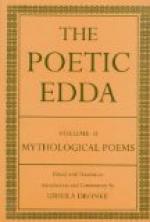The alternative ending of the Helgi and Kara version is interesting as providing the possible source of another Scottish ballad dealing with the same type of story. In The Cruel Knight, as here, the hero slays his bride, who is of a hostile family, by mistake. One passage of Helgi Hundingsbane II. describes Helgi’s entrance into Valhalla, which, taken with the incident of Sigrun’s joining him in the howe, supplies an instance of the survival side by side of inconsistent notions as to the state of the dead. The lover’s return from the grave is the subject of Clerk Saunders (the second part) and several other Scottish ballads.
The Song of the Mill.—The magic mill is best known in the folk-tale, “Why the sea is salt”; but this is not the oldest part of the story, though it took most hold of the popular imagination which loves legendary explanations of natural phenomena. The hero, Frodi, a mythical Danish king, is the northern Croesus. His reign was marked by a world-peace, and the peace, the wealth, the liberality of Frodi became proverbial. The motive of his tale is again the curse that follows gold. It is told by Snorri, in whose work Grottasoengr is embodied.
Frodi possessed two magic quern-stones, from which the grinder could grind out whatever he wished; but he had no one strong enough to turn them until he bought in Sweden two bondmaids of giant-race, Menja and Fenja. He set them to grind at the quern by day, and by night when all slept, and as they ground him gold, and peace, and prosperity, they sang:
“We grind wealth for Frodi, all bliss we grind, and abundance of riches in the fortunate bin. May he sit on wealth, may he sleep on down, may he wake to delight; then the grinding were good. Here shall no man hurt another, prepare evil nor work death, nor hew with the keen sword though he find his brother’s slayer bound.”
But when they wearied of their toil and asked for a little rest, Frodi answered: “Ye shall sleep no longer than the cuckoo is silent, or while I speak one stave.” Then the giant-maids grew angry, and sang:
“Thou wert not wise, Frodi, in buying thy bondmaids: thou didst choose us for our strength and size but asked not our race. Bold were Hrungni and his father, and mightier Thiazi; Idi and Orni were our ancestors, from them are we daughters of the mountain-giants sprung.... We maids wrought mighty deeds, we moved the mountains from their places, we rolled rocks over the court of the giants, so that the earth shook.... Now we are come to the king’s house, meeting no mercy and held in bondage, mud beneath our feet and cold over our heads, we grind the Peace-maker. It is dreary at Frodi’s.”
As they sang of their wrongs by night, their mood changed, and instead of grinding peace and wealth, they ground war, fire and sword:
“Waken, Frodi! waken, Frodi! if thou wilt hear our songs.... I see fire burn at the east of the citadel, the voice of war awakes, the signal is given. A host will come hither in speed, and burn the hall over the king.”




